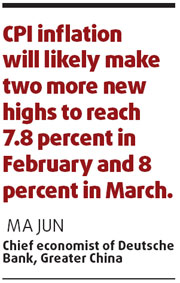Nation faces increasing inflation risk
Updated: 2008-02-23 08:54
The central bank warned on Friday that China is facing an "increasing" risk of inflation and said price levels will remain high throughout the first half of the year.
|
|||
The bank will "further" use the exchange rate policy to balance the economy, the report added.
"(We) will further bring out the role of the exchange rate in adjusting the balance of international payments and promoting balanced economic growth," said the report, which was published on the bank's website.
Analysts said the wording signals that monetary policymakers may consider quickening the pace of yuan appreciation to help curb inflation.
Growth of the consumer price index (CPI), a bellwether of inflation, surged to an 11-year high of 7.1 percent last month as snowstorms cut transportation and power, and pushed up food and energy prices.

Analysts warned the situation may worsen through February and March.
"The underlying inflationary pressure/momentum is even stronger than the January headline number is suggesting, and CPI inflation will likely make two more new highs to reach 7.8 percent in February and 8 percent in March," said Ma Jun, chief economist of Deutsche Bank, Greater China.
He said in a research note that since the snowstorms happened in the second half of January, much of the inflationary impact of the natural disasters will be reflected in February.
Moreover, although raw agriculture prices went up substantially last month, it normally takes one or two months for the pressure to pass through to manufactured and processed food items, which will add pressure to inflation in the following months.
The inclement weather may have disrupted the supply chain of some products, which will take quite some time to recover, Sun Lijian, senior economist with Shanghai's Fudan University, said.
"I heard that in some places, pigs died due to the cold," he said.
Food price rises may in turn spill over to other sectors, pushing up prices of other products and labor costs.
"But as supply recovers and macroeconomic policies are put in place, the pressure will ease in the second half of the year," Sun said.
In a piece of rare wording, the central bank said it will further its exchange rate policy to rebalance the economy.
Yang Fan, an economist with the China University of Political Science and Law, said it implies the authorities may allow quickened appreciation.
But he added that policymakers must remain cautious, as the economy may not be able to afford the repercussions.
The yuan, whose central parity rate set by the central bank hit 7.1463 on Friday - a new high since China broke the peg of the yuan with US dollar in 2005 - has appreciated about 2 percent this year on the back of a nearly 7 percent appreciation last year.
The central bank report said most exporters had adapted better than expected to the stronger yuan.
If exporters and other firms are capable of adjusting to the rising yuan, the more flexible exchange rate will reduce inflationary pressure, as it will drive down import prices of dollar-denominated commodities on international markets, Sun said.
|
|



